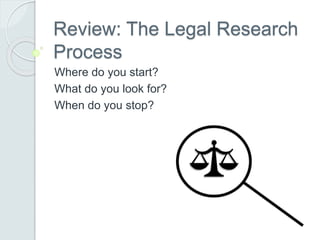
Visualizing the Basic Legal Research Process - PPT
- 1. Review: The Legal Research Process Where do you start? What do you look for? When do you stop?
- 2. Issue Spotting: Break down the client file What issues to research What sources will answer your questions? Where to researc h Statutes Regulation s Cases Secondary What sources to researc h Currency Up-to-Date Recurring When to stop
- 3. Step 1: What do you need to research? • What issues in your client’s case do you need to research? • Think also of jurisdiction Issue Spotting
- 4. Step 2: Make a Plan What types of sources do you need to research? • Primary • Secondary Where should you look for these sources? • Print/Electronic • Free/Low-Cost/ Subscription What features of these sources and databases will benefit your research? • Citators • Annotated/ Unannotated Codes • Headnotes/Key Numbers
- 5. Step 3: Research Secondar y Sources Analyze and explain the law; you may want to start here for explanation and for citations to leading primary sources Primary Sources Provide the text of the law itself; you may find yourself going to secondary sources for understanding of primary sources
- 6. Researching Statutes Annotated Codes • Text of the law • History • Annotations to related cases, secondary sources Unannotated Codes • Text of the law • History When possible, look for an annotated code when researching statutes.
- 7. Researching Cases Full-Text Searching Headnotes to a Case Key Numbers/ Digests Citators Annotations in Annotated Codes, Secondary Sources How to Find Cases
- 8. Step 4: When to Stop? Currency Is your law up to date? Citator Is your law still good law? Iteration Are the same cases recurring in every search?
- 9. Issue Spotting: Break down the client file What issues to research What sources will answer your questions? Where to researc h Statutes Regulation s Cases Secondary What sources to researc h Currency Up-to-Date Recurring When to stop Questions?